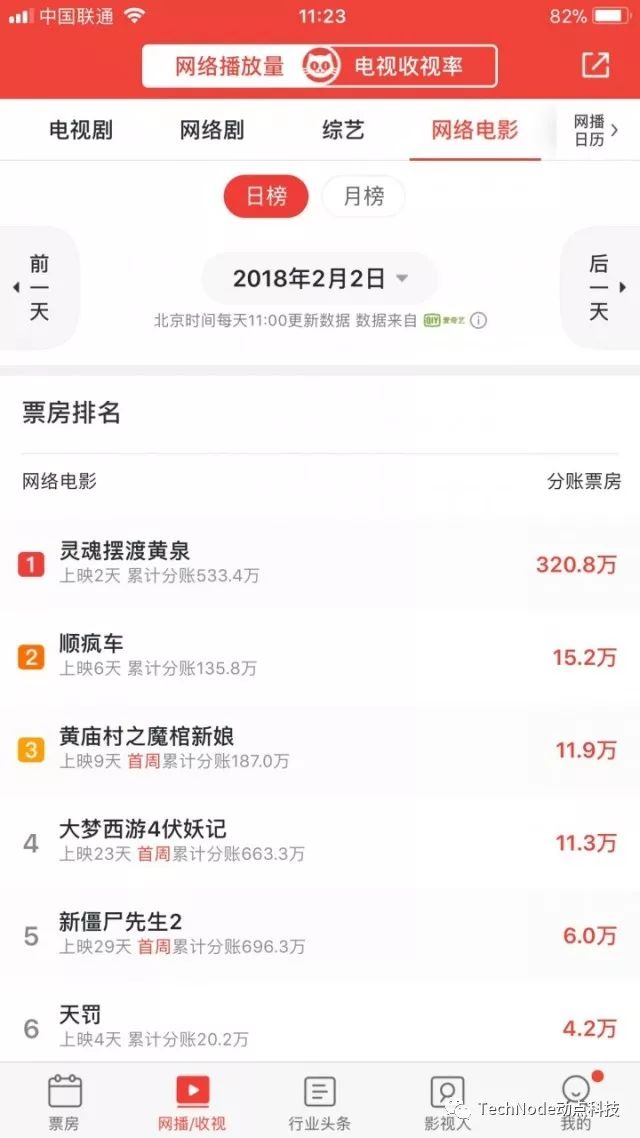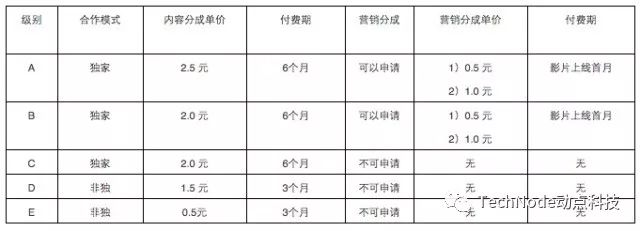Producers leverage iQiyi’s data to make the next blockbuster
Posted TechNode动点科技
tags:
篇首语:本文由小常识网(cha138.com)小编为大家整理,主要介绍了Producers leverage iQiyi’s data to make the next blockbuster相关的知识,希望对你有一定的参考价值。
Tap "Technode动点科技“ for more on China's tech
Keywords:
iQiyi, Big data

By Frank Hersey
“You have to become part of the online scene, you can’t retreat into your own thinking,” Santo Han, screenwriter on The Ferry Man Manjusaka, told TechNode. On that day alone his film made RMB 160,000 on iQiyi, ranking app Maoyan tells us.
Access to audience data is transforming the film industry in China. Movies made for streaming platforms have rapidly become high-quality feature films with lavish budgets and marketing allowances to match. The turf war between the mainstreaming platforms has coincided with changes in technology, changes that have brought more data about the audience and made it easier for them to pay. Add in business models that share revenues based on views with production companies, and the industry is awash with cash and data. This is generating sophisticated content that is expected to become increasingly fragmented to capture diversifying audiences.
iQiyi just about has the lead in terms of rival platforms in China. As it announced its $2.4 billion Nasdaq IPO filing which will give it even more cash to pump into content, we spoke to screenwriters and producers who work with iQiyi to understand the changes to the industry.
Know your audience–and talk to them
“One of the biggest differences between TV broadcasts and online platforms is ‘the user’,” Ma Zhongjun told TechNode. President and chairman of Ciwen Media Group—and a household name in China and Taiwan as a screenwriter—Ma has seen decades of change in China’s entertainment sector.

Still from The Farewell Girls 哀乐女子天团 by Ciwen Media for iQiyi. (Image credit: iQiyi)

“We’re able to gather a lot of data about content from how it is viewed—at what point someone stops watching, which bits they go back and watch again—and then from the other facts such as age and gender,” explained Ge Xufeng, deputy general manager of the Membership Business Department at iQiyi. “This can be passed on to [production] partners along with the danmu from iQiyi and the discussion page, along with information about where people are sharing [links to] the content.”
Danmu (弹幕, sometimes translated as “bullet screen” or “bullet comments”) are the fascinating phenomenon of viewer comments tagged to a particular moment of a program. These comments hurtle across the screen while you watch, providing an additional layer of viewer experience (that thankfully can be switched off).
“The most successful online films have a mostly male audience, and for this, I considered targeting females,” said Santo Han, (who goes by the name Xiao Jixiang Tian 小吉祥天 in Chinese), who was recovering from getting female-friendly The Ferry Man Manjusaka finished and published. “There’ll be word of mouth. After a few years of observation, I’ve realized that females can be good for word of mouth.” All four interviewees talked about the gender difference of viewers of certain types of content.
“You determine which group of fans you want then might try to extend the catchment area out to include others, which is what we try to do,” said Santo Han.

A lineup of titles made by Qi Shu Youyu. (Image credit: Qi Shu Youyu)

Another of iQiyi’s production partners is Qi Shu Youyu(奇树有鱼) which has specialized in online films from the outset. Founder and CEO Dong Guanjie explained the reality of who holds the data: “There are several thousand small production companies, but only a few massive platforms which means information asymmetry.” He pointed out that, at the other extreme, the box office only provides one type of data: how many tickets were sold.
Ma Zhongjun explained that knowing different audiences allows the company to tap into them. “With the big data generated, we can say let’s do this type of drama and tap into its fanbase, or into a previous fanbase or a particular actor’s fanbase or that of a novel. This way, even before we start production we’re already talking to them. Then when we start filming we can share trailers and have a conversation. It’s not like the closed circuit of the past,” said Ma.
Data from platforms such as iQiyi informs decision-making down to individual actors. According to Ma, “We’ll talk to the iQiyi team and say which actor or actors should we use. They might say ‘Definitely not this one’, or ‘You must use this one’. The platform has its own requirements.”
Once uploaded to iQiyi, films have on average 50 tags such as film type—action, drama—but also the emotion of a film. These are used to make recommendations based on the users’ preferences “This is very useful when a film is first put up and over 91% of views come from automatic recommendations,” said iQiyi’s Ge.
Business model and online box office
iQiyi’s Ge Xufeng explained the basics: “Our business model is simple. First of all, we buy. Lots of production companies have made content and we buy the rights from them. Then we’re also making our own. iQiyi puts up the investment and finds producers to come and make content with us. This model means we put up the money and a partner tailor-makes something for us and we give them a set proportion of revenue. The third type is revenue share, that’s the business model we use for films. In this case, the producers invest their own money to make the film and we put it on the platform. Then for every account holder who watches enough for this to qualify as an effective view—over 6 minutes—we allot the agreed amount per effective view to the producer.”

As with traditional cinema box office takings, the figures for streaming platforms are freely available, here on the Maoyan app. The date selected shows Santo Han’s The Ferry Man Manjusaka (灵魂摆渡黄泉) topping the table on its second day of release, taking RMB 3.2 million that day. (Image credit: Maoyan)

As for the payment amounts, it depends on how the film is categorized, in terms of quality and exclusivity. An additional allowance can be made per effective view of top-quality content for marketing costs incurred by the production company. Payments per view can span from RMB 0.5 per view through to a maximum of RMB 3.5 including marketing subsidy.

Payments per effective view across categories of quality and exclusivity. Column six shows the additional allowances for marketing. (Image credit: iQiyi)

37% of iQiyi’s income is from subscriptions, 40% from advertising. The platform had 60.1 million subscribers at the end of February, 98% of whom are paying subscribers. This is up from 10 million in 2015, with 9.3 million added in the last two months alone. Loss-making from the outset, its latest announcement was a net loss of RMB 3.74 despite a 55% revenue increase for 2017 to RMB 17.38 billion yuan. Baidu is and will remain the controlling shareholder and recently propped up iQiyi with an interest-free $100 million loan at the beginning of the year.
How making films for online is (and isn’t) different
Online TV series are already pioneers in production and marketing. Individual episodes of top series cost over 8,000 times as much to make as they did a decade ago. Ma Zhongjun predicts that in the next three years online dramas will overtake broadcast (or broadcast first) dramas in terms of influence.
Budgets for online films are rising steadily. As an example, budgets at Qi Shu Youyu have gone from RMB 300-500,000 at the end of 2015 to RMB 1.5 million per film by the end of 2016. RMB 3.5 million was the going rate in 2017 and Dong is looking at around RMB 5 million by mid-2018 and between RMB 8 and 10 million by the end of the year with RMB 20 million not far over the horizon.
It is worth noting that production companies take around 35-40% of box office takings at cinemas in China, while the agreement with iQiyi is a 50:50 revenue share, meaning even a lower box office online could mean higher returns for makers.

Still from The Ferry Man Manjusaka. (Image credit: iQiyi)

According to screenwriter Santo Han, “The stand-out feature about online films is speed. They are fast. The traditional film industry has been developing for over 100 years, whereas the online film sector has got this far in just 4 years.” His production cycle for a film is less than a month (at a grueling pace), but he doesn’t believe that online-first impacts production standards as people are watching his films on large TV screens. He also says you cannot overthink the 6-minute effective view target for trying to hook viewers.
“What the audience cares about is whether or not it’s a good story, whether it’s moving. Chinese audiences are actually very good,” he says. “They don’t have a requirement for a certain basis, but whether or not you can move them, make them happy. They’re more interested in the content.”
Meanwhile, at Qi Shu Youyu, over 80% of viewers are watching on small mobile devices, snatching moments while eating or waiting for the bus. They save money on special effects and make sure there’s a plot point every couple of minutes. “We have to make things very easy to jump back into so we don’t hold to the concept of 6 minutes [effective view],” said Dong.
The use of small screens requires other tweaks to production. Cinema films are designed to be watched in the dark, with the viewer far from the screen. Qi Shu Youyu’s films are watched at arm’s length at best and in all light conditions. “The distance is actually a psychological difference,” according to Dong.
Piracy and censorship
Platforms like iQiyi could be having an impact on piracy. The rampant VCD and DVD piracy of just a few years ago has moved online. “One approach is that we have improved the quality of content formatting,” said iQiyi’s Ge Xufeng. “We offer Dolby sound and 4k steaming.” This coincided with the sheer ease of mobile payments. Simply scan the QR code on your TV to pay a few RMB to watch a film.

Still from The Farewell Girls. According to Ma Zhongjun, this film represents a high spend on a type of film aimed at the artsy or “hipster” (文艺青年) part of the Chinese audience. (Image credit: iQiyi)
“Requirements for online content are more stringent than for cinema releases. The authorities aren’t concerned which market is bigger. The cinema industry is worth RMB 60 billion, our market is RMB 3 billion. What they’re looking at is the influence of the user. More users, so the requirements are stricter,” explained Dong.
Certain content has been noticed to have been removed at politically sensitive times.
The future of film
The current Hollywood model is a top-down approach out of step with the internet age, according to our interviewees. The internet brings equality between producers and viewers. “It’s an equal exchange where criticism is welcome, which leads to a better conversation, better communication with audiences and greater satisfaction,” said Ma.
Qi Shu Youyu’s Dong believes the industry has yet to reach its rapid growth period. A landmark film that proves that online can produce a blockbuster will change opinions for good and drive even greater development.
“Why do we dare to invest RMB 20 million to make an online movie now? Because the whole market acceptance is growing, people’s willingness to pay to view content is growing and it means box office returns are higher. That’s why we dare. Things are still in the early stages and just getting started,” said Dong.
“I think the subdivision of the internet will become clearer and clearer in the future because big data will give you a picture. A picture of what and where the audience is will emerge and tell you what to make. Small and medium cost movies, those based on specialist literature and art, will be able to find a corresponding crowd, which will be enough for them to live,” said Ma, who believes improving accuracy will go on to better box office successes as a result. “In fact, Americans actually do very well in targeting different groups. Take a look at audiences in cinemas there.”
Fewer than 500 films a year get a theatrical release in China whereas 1,900 films were added to the country’s online platforms last year—1,321 for iQiyi. This provides more space for experimentation. “Cinema releases tend to be more expensive which in turn means people are less likely to take a risk on smaller films or unknown directors. That’s why I think it’s possible that the Internet movie market will bring new opportunities to these people,” said Dong.
But all is not lost for traditional movie theaters. There will be a specialization of films made for the cinema. “The sense of ritual will become stronger and stronger,” says Ma.
Tap “阅读原文” for more information
以上是关于Producers leverage iQiyi’s data to make the next blockbuster的主要内容,如果未能解决你的问题,请参考以下文章
如何在 .htaccess 中为 CDN 添加 Leverage 浏览器缓存?
AI Meets AI: Leveraging Query Executions to Improve Index Recommendations
论文笔记Leveraging Line-point Consistence to Preserve Structures for Wide Parallax Image Stitching
论文笔记Leveraging Line-point Consistence to Preserve Structures for Wide Parallax Image Stitching
论文笔记Leveraging Line-point Consistence to Preserve Structures for Wide Parallax Image Stitching
Sym-NCO: Leveraging Symmetricity for Neural Combinatorial Optimization 学习笔记